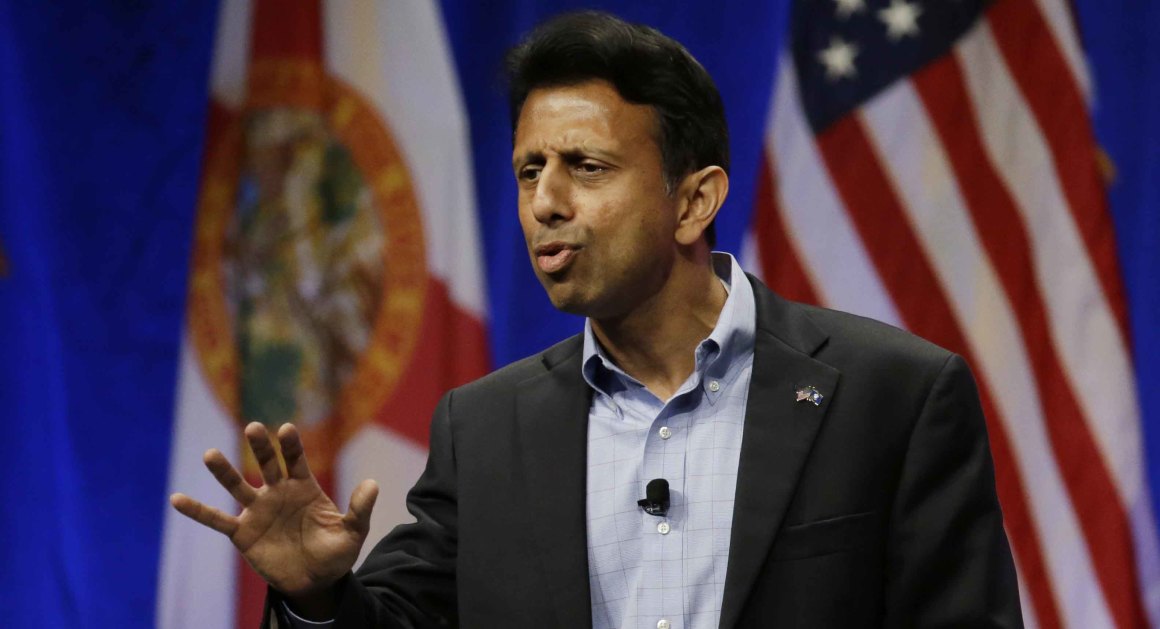
Louisiana Gov. Bobby Jindal on Tuesday said he was ending his presidential bid, saying “this is not my time.”
Jindal had struggled to gain traction as he centered his campaign on Iowa, a state with a large pool of evangelical voters, to whom the governor aggressively sought to appeal. He often failed to poll at even 1 percent in some surveys and underwhelmed in the money race — he had less than $300,000 in the bank heading into October. His low standing in polls meant that he failed to qualify for any of the primetime Republican debates, and was forced to participate in the less-watched undercard debates.
He is the third Republican to suspend his campaign, after former Texas Gov. Rick Perry and Wisconsin Gov. Scott Walker dropped out earlier this year. Jindal made his announcement during an evening appearance on Fox News.
"They raised me to believe Americans can do anything, and they were right, we can. But this is not my time, so I am suspending my campaign for President,” Jindal said in a statement announcing his decision.
"Going forward, I believe we have to be the party of growth and we can never stop being the party that believes in opportunity," he added. "We cannot settle for the left’s view of envy and division. We have to be the party that says everyone in this country — no matter the circumstances of their birth or who their parents are — can succeed in America."
Jindal, a Brown University-educated Rhodes scholar, was once seen as a rising star in the party. After the 2008 election, in which Republicans took a beating up and down the ballot and lost control of the White House, he gained attention as a potential future GOP leader.
Yet in the years to come, Jindal, who spent two terms in Congress before being elected governor in 2007, saw his star fade as he was surpassed by other up-and-coming conservative figures, such as Marco Rubio, Ted Cruz and Rand Paul.
At home, as he confronted debilitating budget problems, he saw his poll numbers drop. A University of New Orleans survey released this month found Jindal’s approval rating in Louisiana at just 20 percent. Republicans have grown increasingly concerned that Jindal’s low standing will imperil their hold on the governor’s office; with a runoff election approaching, polls show Republican David Vitter trailing Democrat John Bel Edwards.
Jindal, though, gave few clues in recent days that he was close to dropping out. Earlier this week, he filed for the New Hampshire primary and announced more stops on his 99-county tour of Iowa.
He informed his top advisers he would drop out on Monday, after he had "been thinking about it for a few weeks,” said Curt Anderson, a top Jindal strategist.
In a conference call with reporters, Anderson called the 2016 GOP primary — dominated by Trump and Carson — “bizarre” more than once. "I don't know that any of us can explain it,” he said of the dynamics.
Jindal had bet heavily on Iowa but his campaign complained loudly and often about the use of national polling to determine who appeared on stage.
"It never occurred to us,” Jindal campaign manager Timmy Teepell said on the phone call, "he could be excluded.”
Jindal ended September with just $261,000 in his campaign account — among the least cash of any candidate in the field. “Fundraising is certainly a part of it,” Anderson said of Jindal’s final decision.
Iowa activists noticed Jindal's frequent visits to the state, and he was often mentioned as a candidate who appealed to evangelical voters, including by Bob Vander Plaats, a prominent social conservative in the state who will be holding a cattle call this weekend and endorsing soon after. Last month he told POLITICO he saw Jindal generating buzz.
The Louisiana governor’s exit could benefit Cruz, who is seeking to consolidate evangelical, tea party and libertarian support in Iowa and is also competing for Vander Plaats’s endorsement.
“We will be aggressively looking at the people who were supporting the governor,” said a Cruz adviser, saying the campaign is looking to draw support from all of their competitors, including those who have dropped out.
“I do know the governor had a lot of people supporting him who were evangelicals,” said the adviser. “To the extent [those supporters] look at Sen. Cruz and see they share the same values, we welcome the opportunity to win them over.”
In last week’s Republican debate in Milwaukee, Jindal tried to show signs of life by repeatedly attacking a fellow governor, Chris Christie of New Jersey, as a big-government liberal. "Chris, look, I'll give you your ribbon for participation, and a juicebox, but in the real world, it's about results,” Jindal said. "It's about actually cutting government spending, not just talking about cutting government spending."
In announcing his departure from the race, Jindal said he would go back to work at his think tank, America Next.
But both Anderson and Teepell hinted at more campaigns to come, noting the fact that, at 44, Jindal was the youngest candidate in the field.
"He has a bright future,” Teepell said.
- Publish my comments...
- 0 Comments
